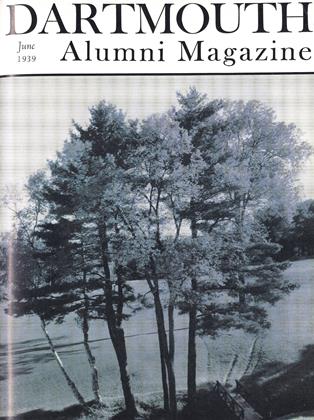Sully's condition is reported somewhat improved, so that he is up and about, but is still in hospital.
Bouton reports the safe arrival of a great-grandson, Samuel Fletcher Shannon. Congratulations to Tilly and fond hopes for Sammie.
Parkhurst has an article, illustrated by a good portrait, in World Youth of April 22, entitled "An Adventure in Internationalism." It seems he is one of the Advisory Council of the movement back of that attractive periodical, indicating one more facet of Parkhurst's many-sided interest.
Field reports regarding the Thousand Islands Bridge, which his son described so graphically to us at reunion last June, that on an average of 2600 cars a month have passed over it since its completion last August. This is 600 more than was anticipated. The traffic ran low in winter months, but by the middle of April it was running at a rate above that of any month since September, and seems sure to boom in the months ahead. All of us who roll on wheels will surely try to traverse that scenic international highway before it becomes too much clogged with unromantic trade.
Hayt reports with enthusiasm the efficiency with which California is pouring its children by the trainload into the great Fair, a half county at a time, with ten-cent admissions and equally attenuated railway fares. Hayt is sure the little folks of all races and origins are getting something greatly worth while out of it, and it gives him a great kick.
Another of his enthusiasms is indicated by the fact that his home garden is both the meeting place and the best part of the show for the Garden Club of his region.
But Hayt also sounds an alarm. The grasshoppers are again on the march as they were fifteen years ago, and headed his way. But he says on that former raid, when they left no vegetation in their wake, they were met and utterly vanquished, ten miles before reaching his place, by an army of 10,000 turkeys. He hopes the turkeys will be mobilized in good season this time.
Whittelsey is quite feeble. Mrs. Whittelsey writes for him, sending a contribution to the Alumni Fund "to keep the class flag flying," and says he is still able to enjoy hearing news of College and of classmates.
Do you old fellows have difficulty in adjusting to the modern custom of calling every acquaintance by his or her first name? In the bygone age when you were adolescent (without being aware of it), the manly way to accost a fellow was by his surname, unless he had a nickname, which was even more a term of intimacy. And a girl was saluted by her surname with a "Miss" before it.
Have you succeeded in making the shift, or is it perhaps due to the vain effort to do so that you no longer can call up either name your friend ever went by before he disappears around the corner?
Secretary, 321 Highland Ave., Fitchburg, Mass.
* 100% subscribers to the ALUMNI MAGAZINE, on class group plan.
 View Full Issue
View Full Issue
More From This Issue
-
 Sports
SportsBig Green Teams
June 1939 By Whitey Fuller '37 -
 Class Notes
Class Notes1918*
June 1939 By ERNEST H. EARLEY -
 Article
ArticleThe Undergraduate Chair
June 1939 -
 Class Notes
Class Notes1929*
June 1939 By F. WILLIAM ANDRES -
 Article
ArticleHanover Browsing
June 1939 By HERBERT F. WEST '22 -
 Class Notes
Class Notes1930*
June 1939 By ALBERT I. DICKERSON
W. D. PARKINSON
Class Notes
-
 CLASS NOTES
CLASS NOTES1996
JULY | AUGUST 2019 -
 Class Notes
Class Notes1932
OCTOBER 1990 By Harry P. Rowe -
 Class Notes
Class Notes1972
May/June 2008 By Lauren "Duff" Cummings -
 Class Notes
Class Notes1938
JANUARY 1963 By MARTIN R. KING, PETER SCHAEFFER -
 Class Notes
Class Notes1915
Jan/Feb 1981 By MRS. CHARLES W. COMISKEY -
 Class Notes
Class NotesClass of 1935
October 1936 By William W. Fitzhugh Jr







